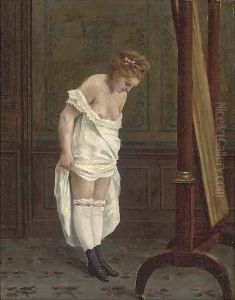Cirle Of Thomas Couture Paintings
Thomas Couture was a French painter and teacher born on December 21, 1815, in Senlis, Oise, France, and died on March 30, 1879, in Villiers-le-Bel, Val-d'Oise. Though not as widely known today, Couture was a significant figure in 19th-century French art, celebrated for his grand historical paintings as well as his rigorous academic training methods. He studied at the École des Beaux-Arts in Paris and won the Prix de Rome in 1837, which granted him the opportunity to study in Italy, a trip that greatly influenced his artistic development.
Couture's work is characterized by its refined brushwork, emphatic realism, and often moralistic themes. His most famous painting, 'Romans during the Decadence' (1847), embodies these qualities and received widespread acclaim for its intricate depiction of Roman decadence, earning him a medal at the Salon. Despite its initial success, Couture's later career did not maintain the same level of prominence, and he increasingly focused on teaching.
As an instructor, Couture was highly influential, advocating a balance between classical techniques and personal expression. He opened his own studio in Paris, where he taught a circle of students who would go on to become notable artists in their own right, including Édouard Manet, one of the pivotal figures in the transition from Realism to Impressionism. Couture's teachings emphasized the importance of draftsmanship, the study of the old masters, and the application of academic principles to modern subjects.
Couture's legacy is twofold: while his artistic output reflects the academic traditions of the French Salon, his pedagogical approach and encouragement of individual expression helped sow the seeds for the more avant-garde movements that followed. Despite the decline in his reputation after his death, recent scholarship has begun to reassess Couture's contribution to 19th-century art, recognizing him not just as a painter of historical narratives, but also as a mentor who played a crucial role in the development of modern art. The 'Circle of Thomas Couture' refers not just to his immediate students but also to the broader impact of his teachings on subsequent generations of artists.
